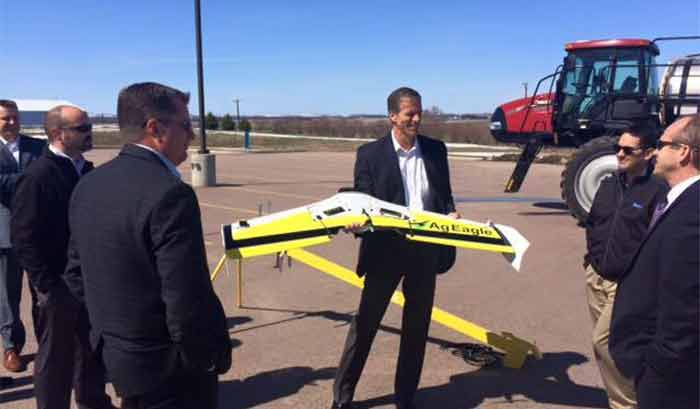
Sen. John Thune (R-SD) (center, during a visit to Sioux Falls in 2016) introduced the Senate’s FAA reauthorization bill, which would not privatize ATC. John Thune/Facebook
With a little more than a month left before the Senate and House enjoy their August recess, the clock is ticking for FAA reauthorization. The agency's current deal will expire at the end of September, and so both the House and Senate are seeking to pass long-term plans that would finally solve, or at least begin to solve, some of the real issues affecting U.S. aviation. The most prominent issue has been ATC privatization, which is backed by President Donald Trump and was included in the House's 21st Century Aviation Innovation, Reform, and Reauthorization Act, introduced by Rep. Bill Shuster (R-PA) on Wednesday.
Sen. John Thune (R-SD) also finally unveiled the Senate's FAA Reauthorization Bill, and as expected it does not include privatization of the nation's air traffic control system. Instead, Thune's bill puts an emphasis on safety and improving the existing ATC system, under FAA management.
“Our legislation focuses on enhancing safety, improving air travel for the traveling public, and reforms to help bring the future of aviation closer to reality,” said Thune. “To address eroding rural access to our air transportation system and delays created by congestion around our most populated corridors, our proposal seeks out new solutions benefiting all Americans who use or depend on air transportation.”
The Senate’s proposal would last through the end of the fiscal year 2021, and it includes reauthorization of the Essential Air Service and Small Community Air Service Development Programs, as well as “new consumer protections for the flying public,” in the wake of the United Airlines-David Dao scandal, and the many other “viral” and highly-publicized passenger incidents making headlines since then.
The response from prominent aviation groups to the House's bill was mostly negative, as the AOPA and five other organizations released a joint statement opposing Shuster's plan, and specifically ATC privatization. The NATCA endorsed the House's bill, citing its importance to the security of air traffic controllers' careers, but also made it clear that it will consider any FAA reauthorization proposals, so long "as it addresses the problems with the status quo and is not a for-profit model."
As for the Senate’s FAA plan, the AOPA is on board.
"As the largest association of pilots and aviation enthusiasts, AOPA supports the Senate FAA reauthorization legislation which will allow the U.S. air traffic control system to continue to be the safest and most efficient in the world, preserves the public benefit that access to aviation brings to rural communities, gives local airports more flexibility to build and repair infrastructure, provides pilots more common-sense protections, and further facilitates the important role general aviation plays in emergencies," AOPA President and CEO Mark Baker said.
Joining the AOPA in support of Thune’s bill are the EAA, NBAA and NATA.
"This bipartisan Senate bill recognizes that general aviation is an equal partner in the nation's air transportation system and points the way to making the FAA more effective," said EAA CEO and Chairman Jack J. Pelton. "It also recognizes that the current U.S. air traffic control structure is already the safest and most efficient in the world, ready for modernization without wholesale transformation and disruption that would come with privatization."
"This bipartisan legislation is the right bill at the right time, helping strengthen and provide stability for the nation's aviation system, so that it remains the world's best five, 10 and 25 years from now," NBAA President and CEO Ed Bolen said. "It takes into account the perspectives of all stakeholders, bringing specific, consensus-based solutions to challenges. On behalf of our more than 11,000 member companies, I thank Sens. Thune, Nelson and other Commerce Committee leaders for moving forward with this legislation."
"The National Air Transportation Association commends Commerce Committee Chairman John Thune (R-SD) and Ranking Member Bill Nelson (D-FL) for the development of an FAA reauthorization bill that all aviation stakeholders should support," President Martin H. Hiller said. "The Thune/Nelson proposal builds upon prior work to produce legislation making the FAA a more efficient and effective agency. The Committee's inclusion of NATA recommendations related to regulatory consistency will, for example, provide the aviation business community with the certainty it needs to continue to invest in jobs and equipment, particularly in rural America."

Sign-up for newsletters & special offers!
Get the latest FLYING stories & special offers delivered directly to your inbox






